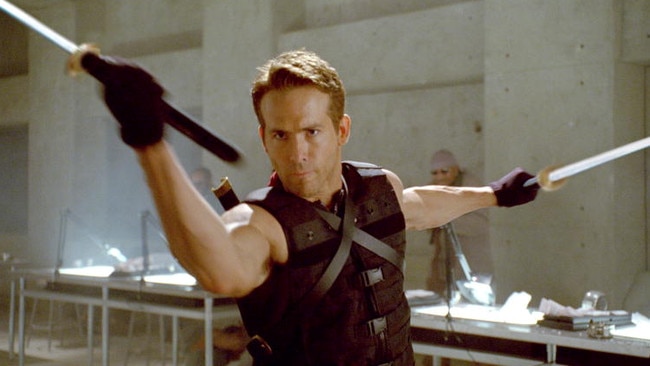Ryan Reynolds gave his ‘Deadpool’ salary to colleagues so first movie could get made
Ryan Reynolds reveals why he gave up his salary on the very first Deadpool film after fighting almost a decade to get backing for the superhero movie.
Movies
Don't miss out on the headlines from Movies. Followed categories will be added to My News.
The success of 2016’s Deadpool was not a foregone conclusion.
After fighting to get the superhero comedy made for nearly a decade before it went into production with a budget of $US58 million ($86 million), Ryan Reynolds — who was also a producer on the film — made the decision to give up his salary.
“When I finally got to make it, it had been almost 10 years at that point. No part of me was thinking when Deadpool was finally greenlit that this would be a success,” Reynolds told The New York Times this week.
“I even let go of getting paid to do the movie just to put it back on the screen.”


He added that the studio also “wouldn’t allow my co-writers Rhett Reese and Paul Wernick on set, so I took the little salary I had left and paid them to be on set with me so we could form a de facto writers room.”
But the 47-year-old said working on a slim budget was ultimately beneficial for the film because it made them focus on telling a good story rather than expensive special effects.
“It was a lesson in a couple of senses. I think one of the great enemies of creativity is too much time and money, and that movie had neither time nor money,” he admitted.
“It really fostered focusing on character over spectacle, which is a little harder to execute in a comic-book movie. I was just so invested in every micro-detail of it and I hadn’t felt like that in a long, long time. I remembered wanting to feel that more — not just on Deadpool, but on anything.”

The movie was a massive success, grossing $US782.8 million ($1.1 billion) worldwide, and led to Deadpool 2 in 2018 and the upcoming Deadpool and Wolverine.
Reynolds said that working with Hugh Jackman — who plays Wolverine and was in the interview with him — in 2009’s X-Men Origins: Wolverine left an impression on him.
“Hugh probably had the biggest imprint on me because one of my earlier jobs was to play Deadpool in his movie, X-Men Origins: Wolverine [2009], and I will never forget seeing what it looked like to lead and produce a movie with humility and a level of graciousness that I frankly had never seen in this business before,” he said.
“It really was an antidote to cynicism for me at the time — I remember thinking, ‘Oh, you can be successful and content and really good at what you do, and you don’t have to be some tortured schmuck who’s wilfully hurting themselves to find some kind of vaporous artistic truth.’”

He added, “My first day, I walked off the set and Hugh said, ‘How do you feel?’ And I muttered, ‘Ah, I wish I could go back to that scene we shot earlier in the day because now I sort of see it.’ Five minutes later, everyone is being asked to come out of their trailers, lights are being flipped back on, wardrobe is being zipped back up. Hugh made it so I could shoot. He didn’t even know me. We had just met. I thought, ‘If I’m ever lucky enough to be breathing the rare air that this guy breathes, this is how you do it.’”
Reynolds told Variety inan interview last week that he didn’t want a bottomless budget for the latest instalment of the franchise, remembering how scrappy he was on the first film.
“Necessity is the mother of invention. The more constraints you place on a creative process, the more you think outside of the box,” he said.
“So, personally, I didn’t want more money than we needed. We wanted just enough money to make what we set out to make, but also find ways to creatively pivot.”
This article originally appeared in Fox News and was reproduced with permission
Originally published as Ryan Reynolds gave his ‘Deadpool’ salary to colleagues so first movie could get made




